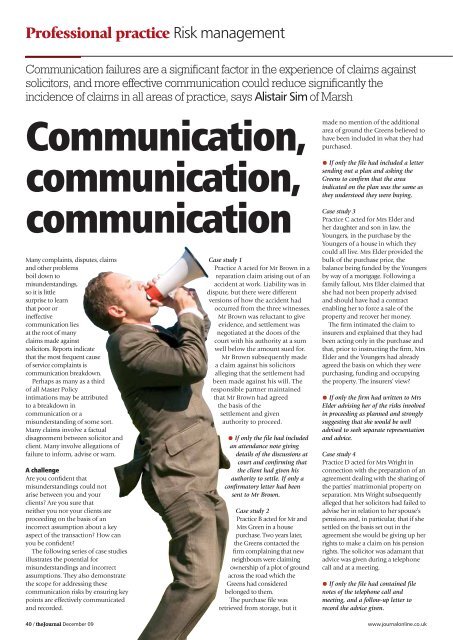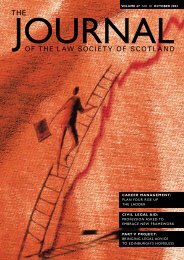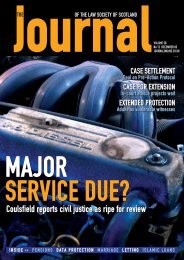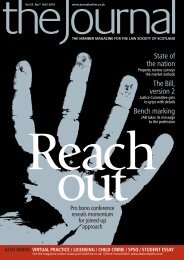Professional briefing - The Journal Online
Professional briefing - The Journal Online
Professional briefing - The Journal Online
Create successful ePaper yourself
Turn your PDF publications into a flip-book with our unique Google optimized e-Paper software.
<strong>Professional</strong> practice Risk management<br />
Communication failures are a significant factor in the experience of claims against<br />
solicitors, and more effective communication could reduce significantly the<br />
incidence of claims in all areas of practice, says Alistair Sim of Marsh<br />
Communication,<br />
communication,<br />
communication<br />
Many complaints, disputes, claims<br />
and other problems<br />
boil down to<br />
misunderstandings,<br />
so it is little<br />
surprise to learn<br />
that poor or<br />
ineffective<br />
communication lies<br />
at the root of many<br />
claims made against<br />
solicitors. Reports indicate<br />
that the most frequent cause<br />
of service complaints is<br />
communication breakdown.<br />
Perhaps as many as a third<br />
of all Master Policy<br />
intimations may be attributed<br />
to a breakdown in<br />
communication or a<br />
misunderstanding of some sort.<br />
Many claims involve a factual<br />
disagreement between solicitor and<br />
client. Many involve allegations of<br />
failure to inform, advise or warn.<br />
A challenge<br />
Are you confident that<br />
misunderstandings could not<br />
arise between you and your<br />
clients? Are you sure that<br />
neither you nor your clients are<br />
proceeding on the basis of an<br />
incorrect assumption about a key<br />
aspect of the transaction? How can<br />
you be confident?<br />
<strong>The</strong> following series of case studies<br />
illustrates the potential for<br />
misunderstandings and incorrect<br />
assumptions. <strong>The</strong>y also demonstrate<br />
the scope for addressing these<br />
communication risks by ensuring key<br />
points are effectively communicated<br />
and recorded.<br />
40 / the<strong>Journal</strong> December 09<br />
Case study 1<br />
Practice A acted for Mr Brown in a<br />
reparation claim arising out of an<br />
accident at work. Liability was in<br />
dispute, but there were different<br />
versions of how the accident had<br />
occurred from the three witnesses.<br />
Mr Brown was reluctant to give<br />
evidence, and settlement was<br />
negotiated at the doors of the<br />
court with his authority at a sum<br />
well below the amount sued for.<br />
Mr Brown subsequently made<br />
a claim against his solicitors<br />
alleging that the settlement had<br />
been made against his will. <strong>The</strong><br />
responsible partner maintained<br />
that Mr Brown had agreed<br />
the basis of the<br />
settlement and given<br />
authority to proceed.<br />
If only the file had included<br />
an attendance note giving<br />
details of the discussions at<br />
court and confirming that<br />
the client had given his<br />
authority to settle. If only a<br />
confirmatory letter had been<br />
sent to Mr Brown.<br />
Case study 2<br />
Practice B acted for Mr and<br />
Mrs Green in a house<br />
purchase. Two years later,<br />
the Greens contacted the<br />
firm complaining that new<br />
neighbours were claiming<br />
ownership of a plot of ground<br />
across the road which the<br />
Greens had considered<br />
belonged to them.<br />
<strong>The</strong> purchase file was<br />
retrieved from storage, but it<br />
made no mention of the additional<br />
area of ground the Greens believed to<br />
have been included in what they had<br />
purchased.<br />
If only the file had included a letter<br />
sending out a plan and asking the<br />
Greens to confirm that the area<br />
indicated on the plan was the same as<br />
they understood they were buying.<br />
Case study 3<br />
Practice C acted for Mrs Elder and<br />
her daughter and son in law, the<br />
Youngers, in the purchase by the<br />
Youngers of a house in which they<br />
could all live. Mrs Elder provided the<br />
bulk of the purchase price, the<br />
balance being funded by the Youngers<br />
by way of a mortgage. Following a<br />
family fallout, Mrs Elder claimed that<br />
she had not been properly advised<br />
and should have had a contract<br />
enabling her to force a sale of the<br />
property and recover her money.<br />
<strong>The</strong> firm intimated the claim to<br />
insurers and explained that they had<br />
been acting only in the purchase and<br />
that, prior to instructing the firm, Mrs<br />
Elder and the Youngers had already<br />
agreed the basis on which they were<br />
purchasing, funding and occupying<br />
the property. <strong>The</strong> insurers’ view?<br />
If only the firm had written to Mrs<br />
Elder advising her of the risks involved<br />
in proceeding as planned and strongly<br />
suggesting that she would be well<br />
advised to seek separate representation<br />
and advice.<br />
Case study 4<br />
Practice D acted for Mrs Wright in<br />
connection with the preparation of an<br />
agreement dealing with the sharing of<br />
the parties’ matrimonial property on<br />
separation. Mrs Wright subsequently<br />
alleged that her solicitors had failed to<br />
advise her in relation to her spouse’s<br />
pensions and, in particular, that if she<br />
settled on the basis set out in the<br />
agreement she would be giving up her<br />
rights to make a claim on his pension<br />
rights. <strong>The</strong> solicitor was adamant that<br />
advice was given during a telephone<br />
call and at a meeting.<br />
If only the file had contained file<br />
notes of the telephone call and<br />
meeting, and a follow-up letter to<br />
record the advice given.<br />
www.journalonline.co.uk










